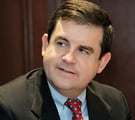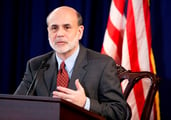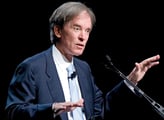
Office address: 50 Hudson Yards New York, NY 10001
Website: www.blackrock.com
Year established: 1988
Company type: investment company
Employees: 19,800+
Expertise: asset management, risk management, ETFs (iShares), fixed income, alternative investments, wealth management, retirement solutions, private equity, infrastructure, real estate, sustainable investing, financial technology
Parent company: N/A
Key people: Larry Fink (CEO), Rob Kapito (president), Joud Abdel Majeid (global head), Stephen Cohen (CPO), Ed Fishwick (CRO), Rob Goldstein (COO), Martin Small (CFO), Chris Meade (CLO)
Financing status: N/A
BlackRock is a global investment company from New York, offering asset management, advisory, and risk management services. The firm manages $11.5 trillion in assets as of October 2024 and operates in over 38 countries. With over 19,800 employees, the company serves clients in more than 100 countries, helping them achieve long-term financial well-being through innovative financial solutions.
BlackRock was founded in 1988 by Laurence Fink and seven partners, driven by a desire to manage assets with a focus on risk management and client interests. The company quickly grew, and in 1999, it launched Aladdin, its proprietary technology that transformed the risk management industry. During the 2008 financial crisis, the company was tapped by the Federal Reserve to assess Bear Stearns' assets, playing a crucial advisory role.
In 2009, it acquired Barclays Global Investors, becoming the world's largest asset manager and integrating both active and index strategies. In 2017, the company deepened its focus on investment stewardship, emphasizing the long-term value of purpose in profitability. By 2024, it partnered with Vestmark to boost model portfolios, further expanding its offerings for registered investment advisors.
BlackRock offers a wide range of investment products and services designed to meet the diverse needs of its clients. Below are the some of their key offerings:
BlackRock’s global team provides insights on markets, economies, and long-term strategies, helping clients navigate the complexities of investing. Whether it is a professional or a new investor, their services aim to support financial success while also empowering employees and giving back to communities.
BlackRock’s culture is built on a commitment to its clients, employees, and core principles. The company focuses on employee growth, offering benefits that support physical, emotional, and financial well-being. The firm provides various resources and benefits to keep employees engaged and balanced, some of which include:
The firm’s commitment to diversity, equity, and inclusion (DEI) is central to its success, fostering an environment where employees feel a sense of belonging. The company’s global platform thrives by incorporating diverse perspectives to deliver the best outcomes for clients. By embracing unique skills and experiences, they empower employees to collaborate effectively and contribute to a shared mission:
The company’s social impact focuses on making financial prosperity accessible to more people and communities. The BlackRock Foundation supports low- to moderate-income households by helping them save, invest, and build wealth. Initiatives include:
BlackRock’s approach to corporate sustainability focuses on long-term value for shareholders, employees, communities, and clients. The company is committed to transparency, providing stakeholders with meaningful sustainability-related information.
Laurence Fink is company’s chairman, CEO, and founder, also serving on the boards of NYU and the World Economic Forum. Before founding BlackRock in 1988, he was a managing director at The First Boston Corporation. Fink earned a BA in political science and an MBA in real estate from UCLA.
The company’s key leadership team includes notable figures who lead the firm’s operations across global markets:
To prepare for potential market volatility, BlackRock advises financial professionals to reduce risk and shift toward safer investment options. With uncertainty ahead, particularly due to macroeconomic concerns and the upcoming elections, the firm highlights the importance of defensive strategies like the BlackRock Flexible Income ETF (BINC). This strategic adjustment also reflects their broader move toward active management, signaling its belief in a more hands-on approach during turbulent times.
The company recently reached an $11.5 trillion milestone in assets under management by the third quarter of 2024. This growth was driven by strong client inflows, notably into ETFs, fixed income, and private assets. BlackRock is accelerating its push into private assets, following acquisitions like Global Infrastructure Partners, and continues to lead in both public and private markets.
Asset managers reported mixed success in attracting inflows for the second quarter as a pickup in market volatility weighed on investors' appetite for riskier assets.
Stomach-turning global volatility has bolstered demand for certain alternative exchange-traded products used by institutions to hedge their portfolios or make directional bets quickly in order to profit from market instability

An internal memo from Bank of America boss Brian Moynihan says the embattled company will slash 3,500 jobs this quarter. But published reports suggest the ax will be broader -- much broader.
With marginal rates likely going up, now is a good time for clients to rethink how they can get the most out of their tax-deferred college-savings plans

BlackRock equity guru says medical sector is undervalued despite surge in cash flow

Bernanke says U.S. doesn't need another batch of quantitative easing; that eases concerns on Wall Street

Spider Gold Trust surpasses bellwether in market cap; 'portfolio antidote for the global financial crisis'

Apparently, investors have seen enough. The recent roller coaster ride on the stock market -- coupled with the meltdown in 2008 -- has clients yanking money out of equity mutual funds at a dizzying pace. And advisers are worried many won't be back for years.
If last week's volatility was a test, go-anywhere funds passed.

The market has been down for five straight weeks. But that isn't stopping Laszlo Birinyi's firm from making another audacious prediction about where the S&P 500 index is headed.

Bill Gross, Jim Rogers, other bigs dump government paper as inflation looms; 'cannot conceive of lending money to the U.S. government for 30 years.'
As exchange-traded funds grow in popularity, more financial advisers are using model ETF portfolios as a low-cost way of managing their clients' money

Prediction of slow growth and high unemployment validated by yesterday's Fed announcement

Critics are not happy with S&P's historic lowering of the U.S. credit rating. They claim the decision is based more on politics than finances. And an alleged $2 trillion 'basic math error' in calculating the government's deficit has not exactly boosted confidence in the rating agency's decision.
